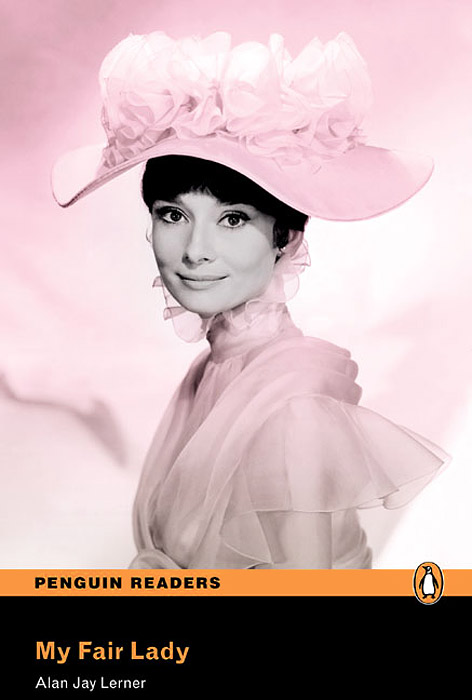Книга: Alan Jay Lerner «My Fair Lady: Level 3 (+ CD-ROM)»

|
Серия: "Penguin Readers" My Fair Lady is the story of a poor young flower-seller and a professor who doesn't like women. The professor decides to teach the flower-seller to speak better English. He wants to change her from street-girl to lady. But what will he learn from her? Издательство: "Pearson Education Limited" (2008) Формат: 130x200, 50 стр.
ISBN: 978-1-4058-7921-7, 978-1-4058-8195-1 Купить за 549 руб на Озоне |
Другие книги автора:
| Книга | Описание | Год | Цена | Тип книги |
|---|---|---|---|---|
| My Fair Lady | "Es grunt so grun, wenn Spaniens Bluten bluhen…" - Jeder Musical-Fan singt diese Zeile sofort mit: Es ist einer der unzahligen Ubungsverse, mit denen der arrogante Phonetik-Professor Henry Higgins… — Kindermann Verlag, (формат: 250x280, 36 стр.) Weltmusicals fur Kinder Подробнее... | бумажная книга | ||
| My Fair Lady: Level 3 | My Fair Lady is the story of a poor young flower-seller and a professor who doesn't like women. The professor decides to teach the flower-seller to speak better English. He wants to change her from… — Pearson Education Limited, (формат: 130x200, 50 стр.) Penguin Readers Подробнее... | бумажная книга |
Alan Jay Lerner
Infobox Actor
name = Alan Jay Lerner
birthdate = birth date|1918|8|31
birthplace =
deathdate = death date and age|1986|6|14|1918|8|31
deathplace =
spouse = Ruth Boyd (1940-1947)
Marion Bell (1947-1949)
Micheline Muselli Pozzo diBorgo (1957-1965)
Karen Gunderson (1966-1974)
Nina Bushkin (m.1977)
academyawards = Best Original Screenplay
1951 "
Best Adapted Screenplay
1958 "Gigi"
Best Original Song
1958 "Gigi"
goldenglobeawards = Best Original Song
1968 "
Best Original Score
1975 "
tonyawards = Bes Book of a Musical
1957 "
Best Original Score
1957"
1974 "
Alan Jay Lerner (
Biography
Born in
Following graduation, Lerner wrote scripts for
Their first hit was "
Lerner poured his excess energy into collaborations with
In 1956 Lerner and Loewe unveiled "
Lerner and Loewe's run of success continued with their next project, a film adaptation of stories from
The Lerner-Loewe partnership cracked under the stress of producing the Arthurian "Camelot" in 1960, with Loewe resisting Lerner's desire to direct as well as write. "Camelot" was a hit nonetheless, with a poignant coda; immediately following the assassination of
Loewe retired to
In 1973 Lerner coaxed Fritz Loewe out of retirement to augment the "Gigi" score for a musical stage adaptation. The following year they collaborated on a musical film version of "The Little Prince", based on the classic children's tale by
In 1978 he penned "The Street Where I Live", his account of three of his and Loewe's successes, "My Fair Lady", "Gigi", and "Camelot" along with autobiographical information. In the last year of his life he published "The Musical Theatre: A Celebration", a well-reviewed history of the theatre replete with personal anecdotes and his trademark wit. A book of Lerner's lyrics entitled "A Hymn To Him", edited by
At the time of Lerner's death, he had just begun to write lyrics for "The Phantom of the Opera", and was replaced by Charles Hart. He had turned down an invitation to write the English-language lyrics for the musical version of "Les Miserables". He also had been working with Gerard Kenny in London on a musical version of the classic film "
Lerner had an addictive personality; for more than twenty years he battled an
Lerner died from
Films
*"
*"The Adventures of Huckleberry Finn", 1960 (lyricist)
*"On a Clear Day You Can See Forever", 1970 (screenwriter/lyricist)
*"Tribute", 1980 ("It's All for the Best," lyricist)
*"Secret Places", 1984 (title song lyricist)
ee also
*
External links
*
*
*
* [http://www.findagrave.com/cgi-bin/fg.cgi?page=gr&GRid=9988255 Alan Jay Lerner's biographic sketch] at
Tags
Источник: Alan Jay Lerner
См. также в других словарях:
performing arts — arts or skills that require public performance, as acting, singing, or dancing. [1945 50] * * * ▪ 2009 Introduction Music Classical. The last vestiges of the Cold War seemed to thaw for a moment on Feb. 26, 2008, when the unfamiliar strains … Universalium
UNITED STATES OF AMERICA — UNITED STATES OF AMERICA, country in N. America. This article is arranged according to the following outline: introduction Colonial Era, 1654–1776 Early National Period, 1776–1820 German Jewish Period, 1820–1880 East European Jewish Period,… … Encyclopedia of Judaism
Mad (magazine) — Mad Editor Harvey Kurtzman (1952–1956); Al Feldstein (1956–1984); John Ficarra (1984– ) and Nick Meglin (1984–2004) Categories Satirical magazine Frequency … Wikipedia
Dubbing (filmmaking) — Dubbing is the post production process of recording and replacing voices on a motion picture or television soundtrack subsequent to the original shooting. The term most commonly refers to the substitution of the voices of the actors shown on the… … Wikipedia
literature — /lit euhr euh cheuhr, choor , li treuh /, n. 1. writings in which expression and form, in connection with ideas of permanent and universal interest, are characteristic or essential features, as poetry, novels, history, biography, and essays. 2.… … Universalium
Media and Publishing — ▪ 2007 Introduction The Frankfurt Book Fair enjoyed a record number of exhibitors, and the distribution of free newspapers surged. TV broadcasters experimented with ways of engaging their audience via the Internet; mobile TV grew; magazine… … Universalium
